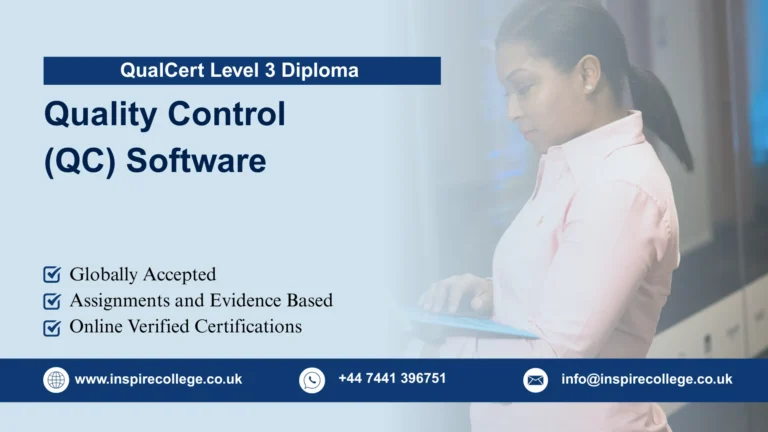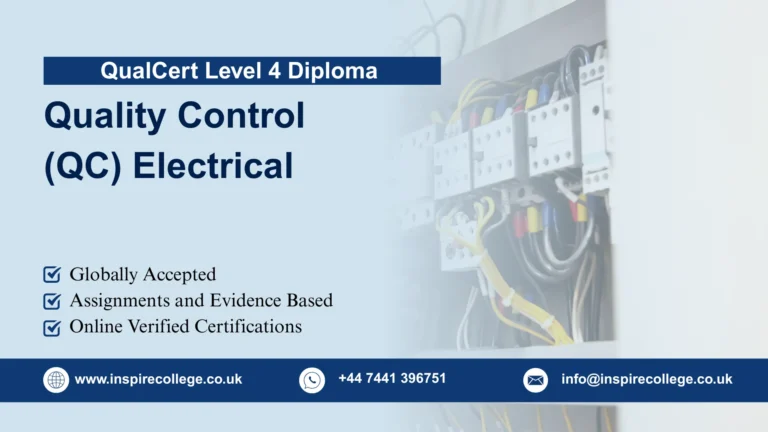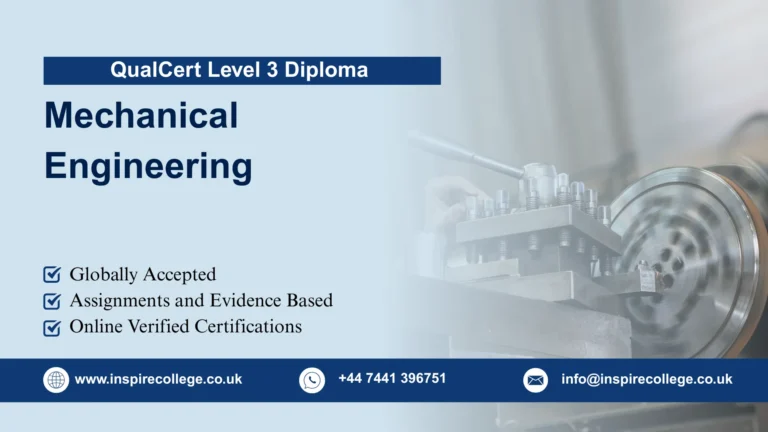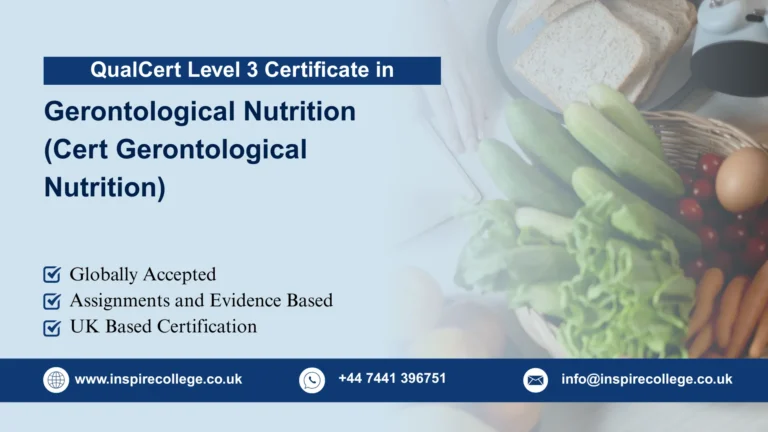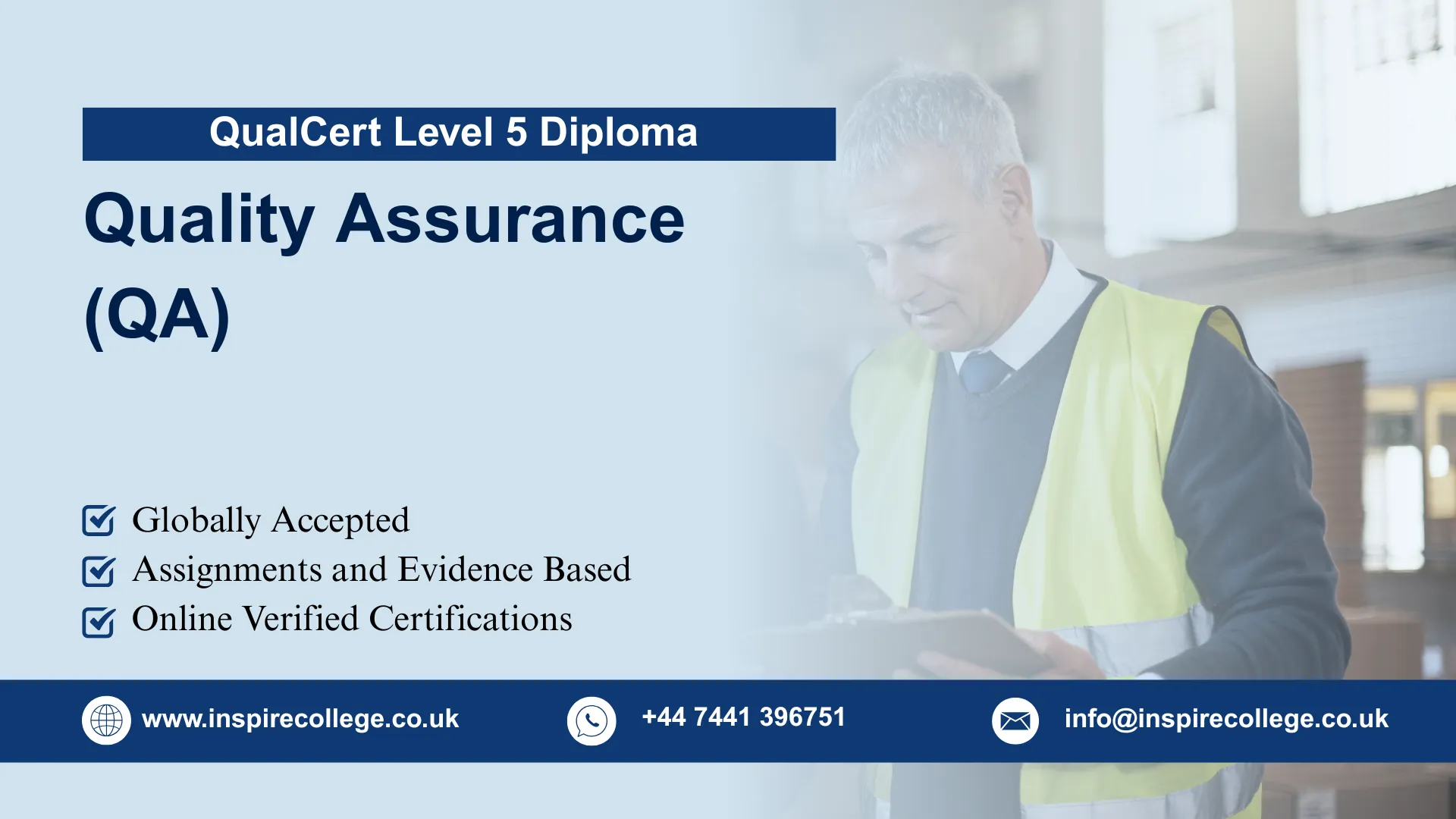
QualCert Level 5 Diploma in Quality Assurance (QA)
In today’s competitive and highly regulated business environment, maintaining consistent quality standards is critical for organizational success. The QualCert Level 5 Diploma in Quality Assurance (QA) is designed to provide learners with the essential knowledge, skills, and practical expertise needed to excel in the field of quality management and assurance. This qualification serves as a bridge between foundational learning and advanced professional practice, making it ideal for individuals who are eager to strengthen their understanding of quality frameworks and compliance systems.
QualCert Level 5 Diploma in Quality Assurance (QA) covers a wide range of topics, including the principles of quality management systems, auditing practices, compliance requirements, supplier quality management, and continuous improvement techniques. Learners will develop the ability to evaluate quality processes, identify areas for improvement, and implement effective quality control measures across different industries. By integrating real-world case studies and industry best practices, the diploma ensures participants are equipped with the tools necessary to meet modern quality standards and regulatory expectations.
Upon completion, graduates will be able to apply practical QA strategies, support organizational compliance, and contribute to operational excellence. QualCert Level 5 Diploma in Quality Assurance (QA) also provides a solid platform for career advancement, preparing learners for roles such as Quality Assurance Officer, Quality Control Specialist, Compliance Coordinator, or Operations Supervisor. Whether you are starting your career in quality assurance or looking to progress to higher-level responsibilities, the QualCert Level 5 Diploma offers the skills and knowledge to succeed in today’s dynamic quality-driven workplace.
To gain admission into the QualCert Level 5 Diploma in Quality Assurance (QA), applicants are required to meet certain entry criteria that ensure they are suitably prepared to engage with the academic and practical demands of the qualification. These requirements are structured to create equal opportunities for learners while maintaining the professional standards expected at this level of study.
Age Requirement
Applicants must be at least 18 years of age at the time of enrollment. This minimum age ensures that learners possess the maturity and readiness needed to undertake the responsibilities associated with quality assurance studies and practices.
Educational Background
A high school diploma or an equivalent secondary school qualification is the minimum requirement for entry. However, candidates who hold additional qualifications, such as certificates or diplomas in areas like quality assurance, engineering, manufacturing, business management, or related technical fields, may find the program more accessible and rewarding. Possessing prior academic exposure to relevant subjects can also provide a stronger foundation for understanding advanced quality assurance concepts introduced in this course.
Work Experience
While not mandatory, having prior experience in roles related to quality assurance, quality control, compliance, production, or process management is highly advantageous. Practical industry experience allows learners to contextualize their studies, apply theoretical knowledge more effectively, and engage with case studies and assignments from a professional perspective. Nonetheless, the course is structured to accommodate both new entrants to the field and those with prior work experience.
English Language Proficiency
Since the course is delivered in English, all learners must demonstrate a sufficient level of proficiency in the language. This ensures they are able to actively participate in lectures, complete written assignments, and engage in professional discussions. For non-native speakers, evidence of English language ability through recognized qualifications such as IELTS, TOEFL, or equivalent assessments may be required. Alternatively, proof of prior education in English may also be accepted.
The QualCert Level 5 Diploma in Quality Assurance is designed to be accessible yet rigorous, offering opportunities for learners at different stages of their academic and professional journey. By setting clear entry requirements, the program ensures that every participant is equipped with the foundation necessary to succeed and progress toward higher-level studies or career advancement in the field of quality management.
Mandatory Units
The QualCert Level 5 Diploma in Quality Assurance (QA) certification is designed to provide a structured and comprehensive framework for developing expertise in quality assurance. Below is the qualification structure, including the Total Qualification Time (TQT) 600, Guided Learning Hours (GLH) 360, and 75 Credits associated with the program.
Fundamentals of Quality Assurance
Quality Control Techniques
Auditing and Inspection Techniques
Data Analysis in Quality Assurance
Continuous Improvement Process (CIP)
Communication and Reporting in QA
Unit 1: Fundamentals of Quality Assurance
Learners will develop a comprehensive understanding of the foundational principles, objectives, and practices of quality assurance across diverse industries. This unit explores the structure and application of quality management systems, highlighting their role in maintaining consistent product and service standards. Learners will also examine regulatory requirements, compliance obligations, and industry-specific standards, gaining insight into how QA supports organizational success and customer satisfaction.
- Demonstrate knowledge of the key principles, concepts, and functions of quality assurance
- Explain the purpose and structure of quality management systems (QMS)
- Analyze the impact of regulatory frameworks and industry standards on QA practices
- Assess the contribution of quality assurance to organizational objectives and customer satisfaction
Unit 2: Quality Control Techniques
This unit equips learners with practical knowledge of quality control methods and tools used to monitor and maintain quality performance. It emphasizes statistical process control (SPC), sampling techniques, and the use of quality tools such as control charts, check sheets, and Pareto analysis. Learners will understand how QA and QC integrate to ensure consistent quality and develop problem-solving skills to address quality challenges through corrective and preventive measures.
- Apply a range of quality control techniques, including SPC and sampling methods
- Utilize quality tools to monitor, evaluate, and improve quality performance
- Distinguish between quality assurance and quality control in organizational contexts
- Implement corrective and preventive actions to resolve quality-related issues
Unit 3: Auditing and Inspection Techniques
Learners will gain a solid grounding in audit processes, inspection methodologies, and compliance verification. This unit covers internal and external auditing, practical inspection approaches, and the role of audits in evaluating organizational systems. Students will learn to identify non-conformities, prepare audit reports, and develop actionable plans to strengthen quality practices.
- Explain the principles and procedures of internal and external quality audits
- Apply inspection techniques to assess compliance with established standards
- Identify non-conformities and propose corrective action plans
- Evaluate the role of auditing and inspection in maintaining QA effectiveness
Unit 4: Data Analysis in Quality Assurance
This unit focuses on developing analytical skills to interpret quality-related data. Learners will use statistical techniques and software tools to evaluate performance, detect trends, and identify improvement opportunities. By linking data analysis with decision-making, learners will understand its role in achieving continuous improvement and informed quality management.
- Apply statistical methods to analyze quality-related data
- Interpret data to identify trends, risks, and opportunities for improvement
- Utilize software tools for data collection, analysis, and reporting
- Assess how data-driven insights support quality assurance and business performance
Unit 5: Continuous Improvement Processes (CIP)
This unit introduces learners to continuous improvement philosophies and methodologies, including Six Sigma, Lean, and Kaizen. Learners will explore how to implement CIP techniques to enhance efficiency, product/service quality, and organizational competitiveness. Emphasis is placed on developing strategies for fostering a continuous improvement culture and measuring the outcomes of improvement initiatives.
- Explain the principles and methodologies of continuous improvement (Six Sigma, Lean, Kaizen)
- Apply CIP tools and approaches to enhance organizational processes and outcomes
- Develop strategies to embed a culture of continuous improvement within teams and organizations
- Evaluate the effectiveness of continuous improvement initiatives on business performance
Unit 6: Communication and Reporting in Quality Assurance
This unit strengthens learners’ ability to communicate quality-related findings, strategies, and recommendations effectively. It emphasizes creating structured reports, presenting QA data to stakeholders, and developing communication strategies that promote transparency and accountability. Learners will also enhance their skills in engaging senior management and building organizational commitment to quality.
- Demonstrate effective communication skills for QA-related reporting and stakeholder engagement
- Prepare professional quality assurance reports on audits, performance, and improvement initiatives
- Deliver presentations that communicate QA strategies and outcomes to diverse audiences
- Assess the importance of transparent communication in fostering a quality-driven culture
The QualCert Level 5 Diploma in Quality Assurance provides learners with a strong balance of theoretical knowledge and practical skills. By mastering these six units, professionals are empowered to improve organizational processes, ensure compliance, drive continuous improvement, and uphold high-quality standards across industries.
The Level 5 Diploma in Quality Assurance (QA) is designed for professionals and aspiring leaders who want to strengthen their expertise in quality management and assurance across different industries. This qualification is particularly suited for individuals who play a role in maintaining standards, ensuring compliance, and driving continuous improvement within their organizations.
This course is ideal for:
- Quality Assurance Managers and Supervisors – Professionals responsible for overseeing QA processes who want to refine their ability to maintain and enhance quality systems, standards, and outcomes.
- Quality Control Professionals – Individuals currently working in QC roles who aim to expand their skills in implementing effective quality control methods and linking them to broader assurance frameworks.
- Project Managers – Professionals leading projects where quality assurance is critical for meeting deliverables, compliance, and customer expectations.
- Compliance Officers – Specialists tasked with ensuring adherence to industry standards, regulations, and certifications who need a deeper understanding of QA principles and auditing practices.
- Production and Operations Managers – Managers overseeing production lines or operational processes who wish to embed quality management systems (QMS) into everyday workflows to enhance efficiency and product/service reliability.
- Engineers and Technicians – Professionals in design, development, or manufacturing roles who must ensure that quality is built into products and processes from the earliest stages.
- Supply Chain and Procurement Specialists – Those managing supplier relationships and procurement activities who need to guarantee supplier quality, performance, and compliance with organizational standards.
- Business Analysts and Consultants – Professionals providing guidance and recommendations on process improvement and quality management who require a structured framework and recognized qualification.
- Health and Safety Officers – Practitioners who must align quality systems with workplace health and safety requirements to maintain compliance and protect organizational integrity.
- Ambitious Professionals Seeking Career Advancement – Individuals aiming to progress in their careers within QA, QC, compliance, or operations management by gaining advanced, industry-recognized credentials.
By addressing the professional needs of these diverse groups, the Level 5 Diploma in Quality Assurance equips learners with the advanced skills, practical knowledge, and confidence to lead quality initiatives, support regulatory compliance, and drive sustainable improvements in organizational performance.
Register Now
FAQs for QualCert Level 5 Diploma in Quality Assurance (QA)

